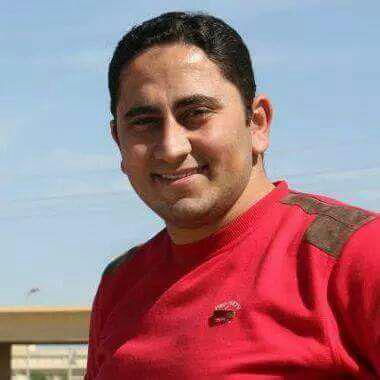
A reporter for the Freedom and Justice newspaper and correspondent of Al Jazeera in the Suez Governorate, 30-year-old Abdul Rahman Shaheen has been detained by Egyptian authorities since 2014 in retaliation for his work as a journalist.
Shaheen had been wanted by the National Security forces since 2013 after he covered the peaceful protests in Suez against the military coup, as well as the repression and abuses committed against the protesters.
Arrest and trial
In the few months before Abdul Rahman’s arrest, while he was trying to stay off the radar and live as normal a life as he could with his new bride, Maryam Al-Sibai, his house was raided many times by the National Security forces. Since the victim wasn’t home, the agents destroyed the furniture, and threatened and terrorised his family.
He was arrested on April 8, 2014 at the post office, where he had gone to collect his ID after he had dropped it there a few days previously. Charged with “communicating with Al-Jazeera” and “spreading lies to mobilize the citizens against the police and military,” among other charges, Abdul Rahman was sentenced to three years in prison on June 4, 2014, and fined 10,000 EGP following a speedy and unfair trial.
Torture and ill-treatment
The victim was initially detained at Itaqa prison, where he was subjected to severe acts of torture. Beaten up and electrocuted, he was constantly humiliated and deprived of family visits. His wife, Maryam, was denied prison visits on a regular basis, and even humiliated and mistreated when she was coming to visit her husband. Abdul Rahman’s torturers made it clear they were specifically targeting him for his work as a journalist, especially as Al Jazeera’s correspondent.
In April 2015, Abdul Rahman was transferred to Gamasa prison, a high security facility located more than 300km away from his family home, which makes visiting him even more difficult for his family.
He remains in poor detention conditions and reports being constantly subjected to different kinds of ill-treatment and humiliation. This past winter, the prison guards gathered and burnt his clothes, leaving him with only light clothing in the middle of winter.
New charges and a new sentence
In February 2015, in another case opened against him, Abdul Rahman was sentenced to an additional jail term of 3 years for “spreading false information from prison.” The main evidence used in this case was a written confession he signed under duress after his torturers threatened to arrest and charge his wife instead of him.
Shortly after this second verdict, he was charged in a third case with “killing and destroying military equipment.” The Suez Military Court sentenced him to life imprisonment in absentia, but later cleared him after his lawyer asked for a revision, pointing out that the alleged facts had occurred while he was in prison.
On September 6, 2017, Alkarama sent a complaint to the Special Rapporteur on the right to freedom of opinion and expression (FREEDX), calling upon the UN expert to remind the Egyptian authorities of their obligations under international law, and to immediately release Abdul Rahman, put an end to the judicial harassment he has been facing, and guarantee his physical and mental wellbeing.
Alkarama remains particularly concerned about the crackdown on freedom of expression in Egypt.
“The repression by the authorities of every dissident voice - including NGOs, human rights activists and journalists - is part of a massive crackdown on basic rights and freedoms which has been ongoing since the coup of 2013, without, however, provoking any significant reaction from the international community,” said Rachid Mesli, Legal Director at Alkarama.
For more information or an interview, please contact media@alkarama.org (Dir: +41 22 734 1008).
